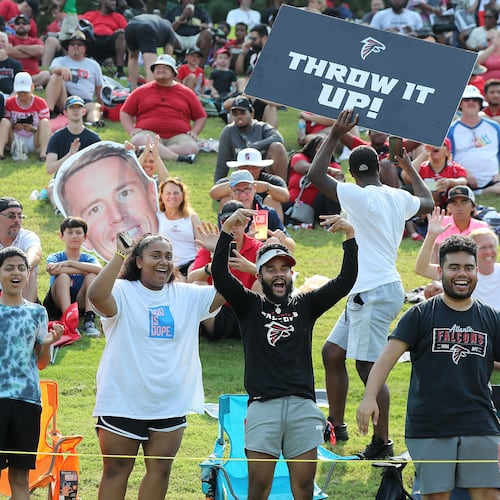The old notion of a player “making a football move” appears headed back into the NFL’s rule book.
Rich McKay, the chairman of the league’s competition committee, explained the proposed new rule of what constitutes a catch at the league’s owners meeting on Monday.
The rule will be voted on Tuesday or Wednesday morning at the latest.
“We tried to tweak, we wanted to tweak, we’ve been tweaking for the last six years on this rule,” said McKay, president of the Falcons. “We realized that was the problem and we needed to start over.”
McKay admitted that fan outrage played a part in an attempt to re-write the rule. He said the league listened to fans about wanting to see more touchdown celebrations and it changed that rule last season. Player and team-centered celebrations were a hit during the 2017 season.
The competition committee is hoping a return to a more traditional catch rule with the “football move” wording will help to clear up confusion in ruling a reception. Those words were taken out of the definition of a catch in 2014, McKay said.
The advent of replay and the detection of slight movement of the ball with a requirement that the player control the ball through contact with the ground led to widespread panic and confusion about what exactly is a catch.
“If Johnny and Jimmy were out in the backyard playing, they know what a catch is,” McKay said. “All of a sudden our language, because of replay, was not allowing that to happen.”
The committee viewed more than 100 catches and non-catches from the last few seasons. They used the Dez Bryant play in the Cowboys’ game against the Packers in 2015, the Devonta Freeman overturned catch in the Falcons’ game against the Redskins in 2015 and the Jesse James overturned catch in the Steelers game against the Patriots last season as exhibits for the new rule.
All three plays were deemed incomplete at the time but would be completions under the new rule.
Under the new rule, if passed, the officials will be looking for three components, according to Al Riveron, the NFL’s senior vice president of officiating.
The three components of a catch would be: control, two feet or another body part on the ground and a football move.
“A football move will be an example of some reaching, bringing the ball in, or a third step,” Riveron said. “Those are a few, but it’s not limited to those examples.”
The “to the ground” language has been removed.
“Last year, he had to survive the ground,” Riveron said. “So, when that ball comes out it’s an incomplete pass. ... That’s over. That was a difficult thing to explain to our fans.”
An unintended consequence of the new rule could lead to more fumbles.
“We’ve looked at that,” McKay said. “We’ve run the numbers. We are not quite as scared. I think if we end up with 10 more fumbles in a year, we’ll take that.”
Riveron said, “Are we going to have more fumbles? We might. But again, we want to take these great catches and make them catches. That’s what our fans want, that’s what our players want and that’s what our coaches want.”
Ravens coach John Harbaugh was credited with helping the competition committee.
“The Ravens, said (the objective part) is three steps, you either take three steps or it’s incomplete,” McKay said. “One of the things to deal with was we needed to put an objective standard as the third act.
“One thing that coach Harbaugh did was he got us to think about the fact that we need to get out of the element of time, how long did he have it? We needed to get to objective element and that’s what we tried to do.”
According to Peter King, of The MMQB.com, who has some access to the competition committee meetings, there is no organized protest to the rule change. A proposal needs 24 of 32 votes to pass.
“For example we had the Super Bowl play, where the receiver took the ball and moved it from one hand to another,” Riveron said. “Did he lose control? No, so therefore it was a touchdown. We have to see loss of control. That would be a touchdown.”
Officials are on board for the prospective change.
“We brought in current day officials and we said, ‘Can you officiate this?’” Riveron said. “They said, ‘Definitely, no problem.’ Before when they were blowing the whistle when we went to the ground. We are no longer going to the ground in these situations, so it’s let’s play football.”
About the Author
Keep Reading
The Latest
Featured


